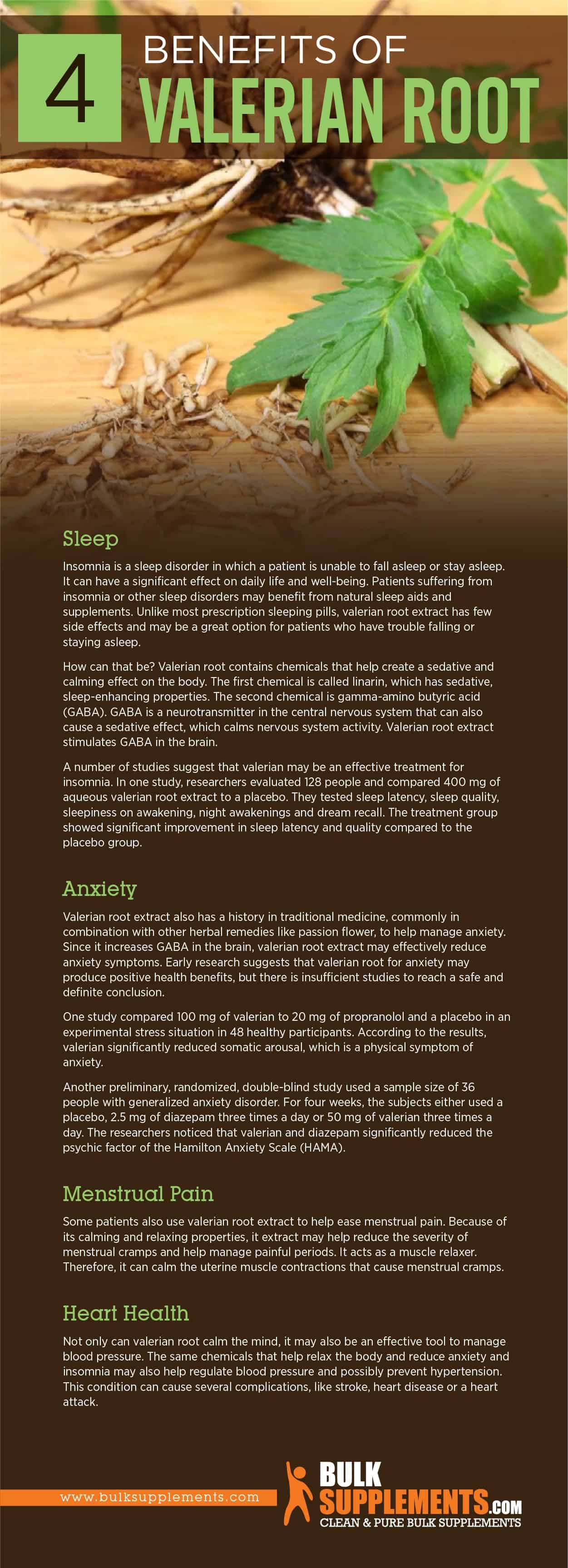Valerian Root Extract: Benefits, Side Effects & Dosage
by James Denlinger Digital Marketing Strategist
What is Valerian Root?
For patients with stress or sleep disturbances, herbal remedies are a common place to turn to for relief. Cue valerian root extract, which is a centuries-old herbal remedy. The extract comes from a perennial plant called Valeriana officinalis or valerian. Native to North America, Europe and Asia, this plant is a common herb with sedative and hypnotic properties. Medical researchers believe that the volatile oil in valerian root is responsible for these effects, which interact with neurotransmitters like GABA and amino acids like tyrosine, arginine and glutamine.
Valerian is also a common dietary supplement and its roots and stems are formed into extracts for capsules or teas. As an herbal medicine, most people use it to help remedy insomnia or anxiety.
Benefits of Valerian Root
Sleep
Insomnia is a sleep disorder in which a patient is unable to fall asleep or stay asleep. It can have a significant effect on daily life and well-being. Patients suffering from insomnia or other sleep disorders may benefit from natural sleep aids and supplements. Unlike most prescription sleeping pills, valerian root extract has few side effects and may be a great option for patients who have trouble falling or staying asleep.
How can that be? Valerian root contains chemicals that help create a sedative and calming effect on the body. The first chemical is called linarin, which has sedative, sleep-enhancing properties. The second chemical is gamma-amino butyric acid (GABA). GABA is a neurotransmitter in the central nervous system that can also cause a sedative effect, which calms nervous system activity. Valerian root extract stimulates GABA in the brain.
A number of studies suggest that valerian may be an effective treatment for insomnia. In one study, researchers evaluated 128 people and compared 400 mg of aqueous valerian root extract to a placebo. They tested sleep latency, sleep quality, sleepiness on awakening, night awakenings and dream recall. The treatment group showed significant improvement in sleep latency and quality compared to the placebo group.
In a separate double-blind study, researchers used a wrist activity meter to study how valerian affected sleep latency on eight subjects. Participants of this study either took 450 to 900 mg of aqueous valerian root extract or a placebo. According to the results, the single dose (450 to 900 mg) of valerian root extract significantly reduced sleep latency and caused more stable sleep in the first quarter of the night (x). The results from these studies suggest that herbs for sleep may be an effective treatment option for insomnia.
Anxiety
Valerian root extract also has a history in traditional medicine, commonly in combination with other herbal remedies like passion flower, to help manage anxiety. Since it increases GABA in the brain, valerian root extract may effectively reduce anxiety symptoms. Early research suggests that valerian root for anxiety may produce positive health benefits, but there is insufficient studies to reach a safe and definite conclusion.
One study compared 100 mg of valerian to 20 mg of propranolol and a placebo in an experimental stress situation in 48 healthy participants. According to the results, valerian significantly reduced somatic arousal, which is a physical symptom of anxiety.
Another preliminary, randomized, double-blind study used a sample size of 36 people with generalized anxiety disorder. For four weeks, the subjects either used a placebo, 2.5 mg of diazepam three times a day or 50 mg of valerian three times a day. The researchers noticed that valerian and diazepam significantly reduced the psychic factor of the Hamilton Anxiety Scale (HAMA).
In another randomized, double-blind, placebo controlled trial, researchers studied 54 participants to compare the effects of kava and valerian root versus a placebo. After seven days, valerian root and kava supplements significantly decreased blood pressure, heart rate reaction and self-reported stress.
Menstrual Pain
Some patients also use valerian root extract to help ease menstrual pain. Because of its calming and relaxing properties, it extract may help reduce the severity of menstrual cramps and help manage painful periods. It acts as a muscle relaxer. Therefore, it can calm the uterine muscle contractions that cause menstrual cramps.
Heart Health
Not only can valerian root calm the mind, it may also be an effective tool to manage blood pressure. The same chemicals that help relax the body and reduce anxiety and insomnia may also help regulate blood pressure and possibly prevent hypertension. This condition can cause several complications, like stroke, heart disease or a heart attack.

Side Effects of Valerian Root
Usually, patients tolerate valerian root very well without any side effects. However, side effects are still a possibility and they may include headaches, dizziness, gastric problems, restlessness, dilated pupils, muscle spasms and pruritus. Studies state that it may also cause tiredness. In one particular study, researchers noted that patients were more tired in the morning after taking 900 mg of valerian root.
Medical researchers have not identified any significant herbal or drug interactions with valerian root. However, it may exacerbate side effects from other medications. It may also have adverse side effects with other sedatives, such as benzodiazepines (Xanax, Valium), barbiturates or central nervous system depressants (Luminal or morphine) or dietary supplements (St. John’s wort, kava or melatonin).
Pregnant or nursing patients should not take valerian root extract. It may cause problems with fetal development. Children younger than three should not take valerian root extract. Researchers have not evaluated how it may affect children. Always check with a doctor or healthcare provider before taking this supplement. If you experience any unusual symptoms or side effects, contact a doctor or healthcare provider.
Why Try Valerian Root Extract
Several studies suggest that valerian root is a safe, effective treatment for anxiety and sleep disturbances. It contains oils and other components that help relax the mind and the body, potentially counteracting stress that affects sleep and mood. Patients may also find it helpful to manage menstrual pain, using the same chemicals to relax the uterine muscles that cause cramps. The herb has a very long history as a natural herbal remedy. Thankfully, supplements are an effective way to capture all of its benefits for a controlled dosage.
Dosage for Valerian Root Extract
The recommended dosage for valerian root extract powder as a dietary supplement is 300 to 600 mg two hours before bedtime. Consult a doctor before taking this supplement and follow all medical advice. It is not a cure for any medical treatment, but it may have positive health effects.
The Bottom Line
Valerian root extract is a safe herbal remedy that has been used in traditional medicine for many years. As a supplement, it is crafted into an extract tea, capsule or powder. Studies suggest that it may be effective as a natural sleep aid for insomnia and a tool to manage anxiety. It may also have the ability to relieve menstrual cramps and even lower blood pressure. Patients usually tolerate the supplement well and it is generally safe as a supplement with few side effects. However, it may interact with certain medications and herbal supplements, so make sure to consult a doctor before taking it. Supplements are not a cure for any medical condition, but they can impact overall health.
Sponsor Ads
Created on Mar 4th 2020 17:49. Viewed 257 times.



